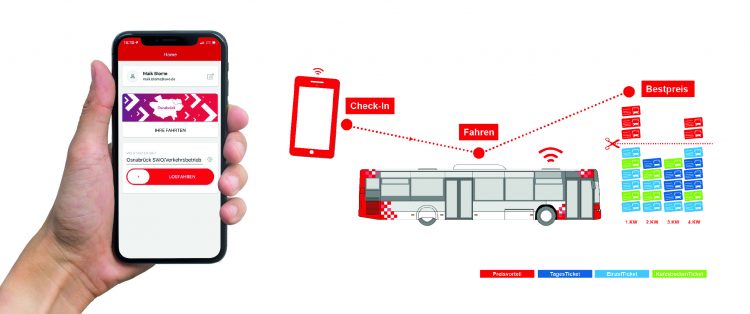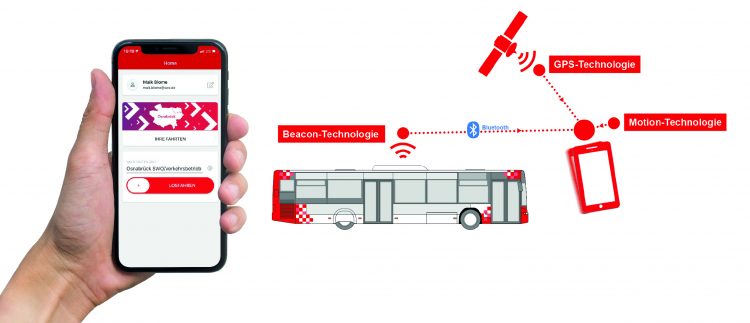Check-in, Be-out (CiBo): the way to truly contactless payments?
- Like
- Digg
- Del
- Tumblr
- VKontakte
- Buffer
- Love This
- Odnoklassniki
- Meneame
- Blogger
- Amazon
- Yahoo Mail
- Gmail
- AOL
- Newsvine
- HackerNews
- Evernote
- MySpace
- Mail.ru
- Viadeo
- Line
- Comments
- Yummly
- SMS
- Viber
- Telegram
- Subscribe
- Skype
- Facebook Messenger
- Kakao
- LiveJournal
- Yammer
- Edgar
- Fintel
- Mix
- Instapaper
- Copy Link
Posted: 1 October 2020 | Maik Blome - Stadtwerke Osnabrück, Werner Linnenbrink - Stadtwerke Osnabrück | 1 comment
Intelligent Transport catches up with Stadtwerke Osnabrück’s Werner Linnenbrink and Maik Blome to find out more about the German city’s novel approach to transport payments and its deployment of Check-in/Be-out (CiBo) technology.


What factors drove Stadtwerke Osnabrück to want to adopt CiBo as a fare collection method?
We are constantly working on the further development of mobility services for the city and surrounding district, including the development and introduction of new digital services to make bus travel safer, more comfortable and more varied. Our Check-in/Be-out system (CiBo) is a milestone for our multi-stage digitalisation strategy. As part of that strategy, we have developed attractive product offers for specific target groups in the first and second stages, and established mobile phone ticketing – introducing CiBo is the preliminary crowning touch.
The system relieves customers of the task of searching for the best ticket choice in occasional traffic. It is easy to use for anyone carrying a smartphone with access to Stadtwerke Osnabrück’s VOS-pilot mobility app. Anyone boarding the bus must actively check in – all customers need to do is wipe or swipe in the corresponding menu item of the app. The data is encrypted and sent to the background system via the mobile phone’s internet connection. If there is no connection, the data is stored temporarily and synchronised as soon as the smartphone is online again. Check-out then takes place automatically when the passenger exits the bus and, for peace of mind, the passenger receives a confirmation directly via push notification.
Payment is made at the end of the month on the basis of a downstream best-price guarantee, whereby the system takes all routes and options into account and finally calculates the cheapest price. All used mobility services are taken into account, not just bus journeys. Billing is then handled via a monthly SEPA debit. For us, being mobile means being free, and you can hardly get more freedom and flexibility than travelling by bus than with CiBo.


What kind of challenges have you faced in getting the system up and running?
CiBo is a beacon of digital transformation for the mobility sector of Osnabrück’s public utilities. In order to make it shine and at the same time meet the highest standards, we had to overcome some very different challenges. This started with bringing together the different providers with different offers and combining all sales information from all mobility areas into one database. In addition, the system had to meet all the requirements of the GDPR for handling passenger data – after all, downstream best price invoicing requires the temporary storage of personal transaction data. It goes without saying: there can be no CiBo without data security and the expressed consent of the customer.
When developing and introducing CiBo, it was important for us to have the support of two reliable partners for the technical implementation: highQ Computerlösungen GmbH from Freiburg and eos.uptrade GmbH from Hamburg. highQ operates a central mobility platform that implements interfaces both to the VDV-KA standard for the e-ticketing area in public transport and to the HUSST standard for the general area of sales offers and sales data. All in all, the mobility portal and the background system have a modular structure so that further modules and module components from partners can be efficiently integrated into the overall system via variable interfaces. In the long term, our digitalisation strategy is aimed at ensuring that our passengers only have to log in once with the login data specified during registration and can always move around safely throughout the entire mobility offering – from public transport and car sharing to the rental of cargo bicycles and pedelecs.
Are there any concerns in terms of how less tech-savvy users will adapt to CiBo, and if so, how will you support them?
We do not yet have any concrete experience from the customer’s point of view as we are still in the middle of a multi-stage test procedure. The system is being refined at every stage and with every update, and only when it has passed all four test phases positively will it go live. After all, this system changes the entire bus ticket sales process for Osnabrück’s citizens. In future, customers will have the highest possible flexibility and the certainty that they always travel quickly and easily at the lowest possible price. We want to be sure that it will work and that our passengers will be able to benefit fully from it. With years of experience in public transport, we know that absolute customer confidence is key to success.
The system has worked very well in the two test phases that have been successfully completed so far and has met all requirements, from simple usage to secure and accurate data handling. A Bluetooth and low-energy transmitter (SiMobility beacon) in the buses is used to record the customer’s exact route data and compare it with the GPS position data of their smartphone. The beacon works independently without connection to a data network and sends encrypted, dynamic broadcast signals to the VOS-pilot app. The third aspect, outside of GPS position determination and beacon technology, is the motion technology within smartphones. With this, it is possible to detect whether the customer is sitting on the bus or, for example, walking beside the bus.
We will continue to optimise the app to keep the technical hurdles as low as possible. I am sure that everyone who can use a smartphone will be able to ride the bus safely and easily with CiBo.
As the first example in Germany, are you hoping your implementation will act as a trendsetter for other authorities?
We are well aware that we are playing a pioneering role for the entire local transport industry with our CiBo system. Our goal is to make it as easy and comfortable as possible for people to be mobile. To achieve this, we are breaking new ground in our mobility strategy, but this does not only apply to the development of a functioning digital payment system.
In February, for example, we set a target with our new bus network to gradually transition to operating only e-buses on the central metro bus lines through the city of Osnabrück, among other things. We are already transporting passengers from A to B in an environmentally-friendly way with more than a dozen electrically-powered buses. By 2022 the number of e-buses is expected to rise to around 60. By then, Stadtwerke Osnabrück will be operating one of the largest fleets of e-buses in Germany. If others follow our example, we are happy to act as a trendsetter.
What does the future hold for fare collection in Osnabrück? Is CiBo part of a wider project to improve ease of access and ease of use for public transport?
Our long-term, modular mobility strategy is far from complete. Even after this step, Stadtwerke Osnabrück will continue to work on improving user-friendliness and access to public transport. In the medium term, we will significantly reduce the standing times of buses with Check-in/Be-out, as payment on boarding is no longer required. At the same time, we will improve access to public transport and reduce existing inhibitions. The attractiveness of bus travel will be significantly increased. The introduction of CiBo also represents a considerable relief for bus drivers as they will be able to fully concentrate on the traffic. We are convinced that CiBo, as a central component of our overall strategy, will fundamentally change the mobility behaviour of
Osnabrück’s citizens in the coming years. It is very important that customers keep the responsibility to check in when travelling so that they can gain confidence in the new technology. In the long term, however, we could even envisage a Be-in/Be-out system in which check-in and check-out are fully automated via smartphone recognition, but we are still at the very beginning of the technical development for this.


Biographies




Related topics
Mobility Services, Passenger Accessibility, Ticketing & Payments, Travel & Passenger Information
Issue
Issue 3 2020
Related cities
Germany
Related organisations
Stadtwerke Osnabrück









TARC, the transit agency in Louisville KY USA, has been using a system like this for over a year with great success. Implications for addressing equity issues are also huge. Expect to see a lot more of CIBO in the future.